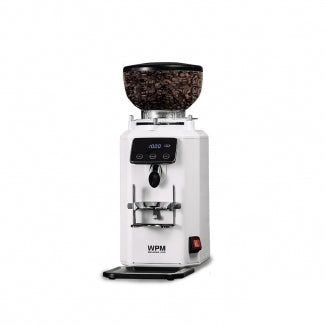Industrial Coffee Grinder for Bulk Brewing: A Must-Have Tool
Industrial Coffee Grinder for Bulk Brewing: A Must-Have Tool
Blog Article
Industrial Coffee Mill Guide: Boost Performance and Quality
In the affordable landscape of coffee manufacturing, picking the right commercial coffee mill plays a critical function in improving both effectiveness and item high quality. Comprehending the subtleties of numerous mill kinds and essential features-- such as adjustable grind settings and robust construction-- can considerably influence the final flavor account of the coffee.
Comprehending Grinder Types
When selecting a commercial coffee grinder, understanding the different kinds readily available is crucial for maximizing both flavor removal and functional effectiveness. Both key kinds of mills are blade mills and burr grinders. Blade mills utilize sharp blades that chop coffee beans right into irregular sizes, resulting in irregular removal and potentially undesirable tastes. While blade grinders are often more suitable and cost effective for small operations, they are generally not recommended for commercial use.

Ultimately, choosing the appropriate kind of mill is essential to keeping quality and performance in coffee production, making it critical for companies to spend in top quality burr mills for optimum results.
Secret Attributes to Consider
Choosing a commercial coffee grinder needs cautious factor to consider of several essential functions that can significantly influence both performance and the general coffee experience. Among the key aspects to examine is the grinding device. Burr mills are generally chosen over blade grinders, as they supply a regular work size, which is essential for ideal removal and taste.
An additional essential feature is the grinder's capacity. Depending on the volume of coffee you need to process, choose a model that can handle your needs without compromising rate or high quality. In addition, take into consideration the grind setups offered. A versatile mill with numerous setups permits you to customize the work dimension to different brewing methods, enhancing the coffee's flavor account.
Evaluate the mill's noise degree, especially in an active café or manufacturing environment, where too much noise can be disruptive. Spending in a grinder that balances these attributes can considerably enhance both operational performance and the quality of the coffee offered.
Optimizing Grinding Process
To attain the best results article in coffee preparation, enhancing the grinding procedure is essential. The grind size substantially affects removal, flavor, and overall high quality of the brewed coffee.


In addition, monitoring the grinding rate can optimize the procedure. Slower grinding typically creates less heat, protecting delicate tastes and scents. Alternatively, much faster grinding might create too much warm, negatively affecting the coffee's high quality.
Maintenance and Care Tips
Proper maintenance and treatment of commercial coffee mills are important for making sure ideal efficiency and durability. Regular cleaning is the foundation of upkeep; deposit accumulation can affect flavor and grinding performance. It is a good idea to clean the mill after each usage, cleaning down the outside and getting rid of any kind of coffee grounds from the burrs.
Furthermore, inspect the grinding burrs for wear and tear. Dull burrs can compromise grind uniformity, so they need to be changed as needed. Industrial Coffee Grinder. Regularly calibrating the grinder is also important, as this preserves the wanted grind size for various brewing approaches
Lubrication of relocating components must be carried out according to the maker's specs, imp source as this decreases rubbing and lengthens the life of the devices. It is important to make use of food-grade lubes to make certain safety and security and compliance with wellness guidelines.
Lastly, keep the grinder in a secure and completely dry environment to stop rust and rust. By sticking to these upkeep and treatment tips, operators can improve the effectiveness of their industrial coffee mills while making certain top notch output and extended functional life.
Roi Analysis
Assessing the roi (ROI) for commercial coffee grinders is critical for services looking for to maximize their coffee manufacturing capabilities. A thorough ROI evaluation helps figure out the economic practicality of purchasing high-quality grinders, enabling services to evaluate the first expenses against possible gains.
To perform an extensive ROI analysis, companies ought to consider a number of vital why not look here elements. First, evaluate the acquisition cost of the grinder, including installment and any type of needed modifications to existing facilities. Next off, determine operational prices, including power consumption, upkeep costs, and labor performance enhancements. High-performance mills usually lead to lowered grinding time and boosted throughput, which can considerably enhance productivity.
In addition, consider the effect on item top quality. Industrial Coffee Grinder. Superior grinders yield a more consistent grind size, which can boost flavor profiles and consumer contentment, eventually driving sales. By increasing the top quality of the final item, services can warrant higher rates, causing boosted revenue
Conclusion
In recap, an industrial coffee mill plays a critical duty in improving both effectiveness and item high quality within coffee production. By selecting high-quality burr mills outfitted with vital functions such as flexible work settings and durable building, services can ensure optimum flavor extraction. Routine maintenance is essential for maintaining grinder performance and taking full advantage of client complete satisfaction. Eventually, the tactical investment in a reputable mill adds dramatically to improved profits and competitiveness in the coffee market.
In the competitive landscape of coffee production, choosing the appropriate industrial coffee grinder plays a crucial function in enhancing both efficiency and item top quality. The 2 key types of mills are blade mills and burr grinders. Within the burr grinder category, there are level burr grinders and cone-shaped burr mills, each with its advantages. Burr mills are normally preferred over blade grinders, as they provide a constant grind size, which is vital for optimum extraction and flavor.
In recap, a commercial coffee grinder plays a pivotal function in boosting both performance and item quality within coffee manufacturing.
Report this page